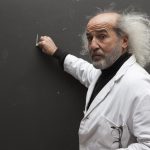 Last year I wrote about a study exploring our perceptions of creativity, and more importantly who we perceive to be creative. It found that men were often perceived as being more creative than women in the workplace.
Last year I wrote about a study exploring our perceptions of creativity, and more importantly who we perceive to be creative. It found that men were often perceived as being more creative than women in the workplace.
Might age also have an influence? That was the question posed by a recent study that examined the age at which creative breakthroughs are made in science. It found that age was much less influential than our productivity. In other words, scientists can produce high-impact research at any stage of their careers, just so long as they maintain their effort levels.
“Science has an exceptional set of tools and reputation for predicting natural phenomena,” the authors say. “When we turn these tools to scientific careers, we observe the same degree of predictability: an ability to quantify the evolution of scientific careers. Understanding the laws and the patterns that govern our careers could significantly enhance scientific output. It may also help identify and nurture individuals who are poised to make big discoveries and encourage the scientific community to offer them the resources and opportunity to do so.”
Maintaining motivation
Alas, a second study from researchers at the University of Aberdeen sheds some light on why maintaining that motivation may not be easy. It found that experienced workers can often end up feeling like an office newbie by the rapid march of technology, which can typically result in them leaving the labor force entirely.
The study highlights the damage caused by so called educational mismatch. The authors analyzed 30,000 scientists and engineers who had been in the workforce for 20 years or more. The analysis revealed that as soon as people feel their education is no longer a good match to their job, some 40% of them fall into retirement.
It’s an interesting finding as such educational mismatches have typically been examined when they occur at the start of one’s career. The findings reveal however that it’s just as important at the end as at the beginning.
“Like many workers, the job requirements of scientists and engineers are constantly evolving as technology and new methods develop, and so the need to reinvest in training and development is of paramount importance,” the authors say.
“If this doesn’t happen then mismatch will become more obvious and will have an impact on workplace satisfaction and lower earnings, which often leads to an employee leaving his or her job,” they continue.
A sizeable problem
It emerged that roughly 40% of scientists and engineers who had recently retired fell into this group. Given the results of the initial study, it’s easy to see how we could be missing out on a great deal of scientific output due to something that’s relatively easy to rectify.
Something as simple as providing training opportunities to help address the educational mismatch can ensure that the valuable skills and experience of older employees aren’t lost prematurely.
With many organizations now living or dying based upon the skills and knowledge at their disposal, this is hopefully food for thought.